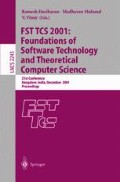Abstract
We consider the problem of scheduling n jobs on a single machine. Each job has a release date, when it becomes available for processing, and, after completing its processing, requires an additional delivery time. Feasible schedules are further restricted by job precedence constraints, and the objective is to minimize the time by which all jobs are delivered. In the notation of Graham et al. [2], this problem is noted 1∣r j, prec∣Lmax. We develop a polynomial time approximation scheme whose running time depends only linearly on the input size. This linear complexity bound gives a substantial improvement of the best previously known polynomial bound [4].
Supported by the “Metaheuristics Network”, grant HPRN-CT-1999-00106, and by Swiss National Science Foundation project 20-63733.00/1, “Resource Allocation and Scheduling in Flexible Manufacturing Systems”.
Access this chapter
Tax calculation will be finalised at checkout
Purchases are for personal use only
Preview
Unable to display preview. Download preview PDF.
References
M. R. Garey and D. S. Johnson. Computers and intractability; a guide to the theory of NP-completeness. W.H. Freeman, 1979.
R. Graham, E. Lawler, J. Lenstra, and A. R. Kan. Optimization and approximation in deterministic sequencing and scheduling: A survey. volume 5, pages 287–326. North-Holland, 1979.
L. A. Hall and D. B. Shmoys. Approximation algorithms for constrained schedulingproblems. In Proceedings of the 30th IEEE Symposium on Foundations of Computer Science (FOCS 1989), pages 134–139, 1989.
L. A. Hall and D. B. Shmoys. Near-optimal sequencingwith precedence constraints. In Proceedings of the 1st Integer Programming and Combinatorial Optimization Conference (IPCO1990), pages 249–260. University of Waterloo Press, 1990.
L. A. Hall and D. B. Shmoys. Jackson’s rule for single-machine scheduling: Making a good heuristic better. MOR: Mathematics of Operations Research, 17:22–35, 1992.
J. R. Jackson. Schedulinga production line to minimize maximum tardiness. Technical Report Research Report 43, Management Science Research Project, UCLA, 1955.
B. J. Lageweg, J. K. Lenstra, and A. H. G. R. Kan. Minimizing maximum lateness on one machine: Computational experience and some applications. Statist. Neerlandica, 30:25–41, 1976.
J. K. Lenstra, A. H. G. R. Kan, and P. Brucker. Complexity of machine scheduling problems. Annals of Operations Research, 1:343–362, 1977.
Author information
Authors and Affiliations
Editor information
Editors and Affiliations
Rights and permissions
Copyright information
© 2001 Springer-Verlag Berlin Heidelberg
About this paper
Cite this paper
Mastrolilli, M. (2001). Grouping Techniques for One Machine Scheduling Subject to Precedence Constraints. In: Hariharan, R., Vinay, V., Mukund, M. (eds) FST TCS 2001: Foundations of Software Technology and Theoretical Computer Science. FSTTCS 2001. Lecture Notes in Computer Science, vol 2245. Springer, Berlin, Heidelberg. https://doi.org/10.1007/3-540-45294-X_23
Download citation
DOI: https://doi.org/10.1007/3-540-45294-X_23
Published:
Publisher Name: Springer, Berlin, Heidelberg
Print ISBN: 978-3-540-43002-5
Online ISBN: 978-3-540-45294-2
eBook Packages: Springer Book Archive

